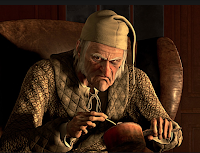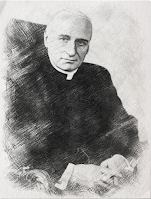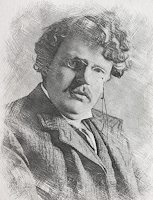No, really, it’s still Christmas. Despite the common belief that “the Christmas Season” starts the day after Thanksgiving (or, for some, after Independence Day) and runs until 9:00 am on December 25, Christmas actually begins at sundown on December 24 and runs for the next dozen days . . . although we’re off the hook regarding gifts, unless you include or hold off until January 6.
All of which is a complicated and indirect way of getting around to our annual Paean of Praise for Ebenezer Scrooge, Charles Dickens’s fictional miser who epitomizes the opposite of Christmas for virtually everyone familiar with “A Christmas Carol.” Every year we make the same point, that Scrooge is a deeper and more “layered” character than perhaps even Dickens realized, but we’ve got a few new insights this year so we can make the point in a different way.
First, the obvious point. Do you know what virtually everyone misses about the story? The fact that Scrooge was absolutely, scrupulously honest. Most dramatic adaptations make him into some kind of crook, but that actually detracts from the point Dickens was making.
 |
| "Bah. Humbug." |
It is, in fact absolutely essential to the story that Scrooge’s honesty and integrity be beyond question. Think about it. If anyone but Scrooge had told people about being visited by three spirits, he would have been called a liar.
But Scrooge? You didn’t question Scrooge’s word on anything: “And Scrooge’s name was good upon ’Change for anything he chose to put his hand to,” i.e., sign his name on any financial or legal document. Meaning if Scrooge said something, you could literally bank on it. If anyone else had said it, he or she would have been locked up in Bedlam as a lunatic or delusional.
 |
| Ryan confused justice and charity |
Scrooge’s problem was he had no charity at all. None. Zip. Zilch. He would give you exactly your just due and not a farthing more. It’s when charity is added to justice (it cannot replace justice) that Scrooge becomes more fully human, giving gifts, donating to charity, raising Bob Cratchit’s salary, and so on. Despite what Msgr. Ryan theorized about a living wage, it’s important to note that Scrooge wasn’t being unjust by paying Cratchit so little, he was being uncharitable. As Pope Pius XI explained, possibly in refutation of Msgr. Ryan’s theories,
First, so as to avoid the reefs of individualism and collectivism. the twofold character, that is individual and social, both of capital or ownership and of work or labor must be given due and rightful weight. Relations of one to the other must be made to conform to the laws of strictest justice — commutative justice, as it is called — with the support, however, of Christian charity. (Quadragesimo Anno, § 110.)
Translation: commutative justice demands that an employer pay a market-determined just wage — which Scrooge was doing, or Cratchit would have gone where he could be paid more. Charity demands that employers add more when necessary — which Scrooge did, once he saw the light (so to speak). Of course, social justice demands that Scrooge open up ownership opportunities and means for Cratchit . . . but that gets a bit beyond the point Dickens was making.
Notice that Scrooge didn’t stop being a banker or carrying out business (or how could he have employed Cratchit?), but in addition to justice he added charity. You can sometimes fulfill the demands of justice by keeping completely to yourself and not doing a damned thing for other people, but if you want to be more fully human, you have to add charity . . . and it must be completely voluntary, or it isn’t charity, but injustice (except in extreme cases, but that’s an often misunderstood topic for another day).
Once charity was added to Scrooge’s strict sense of justice —
Scrooge was better than his word. He did it all, and infinitely more; and to Tiny Tim, who did not die, he was a second father. He became as good a friend, as good a master, and as good a man, as the good old city knew, or any other good old city, town, or borough, in the good old world. Some people laughed to see the alteration in him, but he let them laugh, and little heeded them; for he was wise enough to know that nothing ever happened on this globe, for good, at which some people did not have their fill of laughter in the outset; and knowing that such as these would be blind anyway, he thought it quite as well that they should wrinkle up their eyes in grins, as have the malady in less attractive forms. His own heart laughed: and that was quite enough for him.
He had no further intercourse with Spirits, but lived upon the Total Abstinence Principle, ever afterwards; and it was always said of him, that he knew how to keep Christmas well, if any man alive possessed the knowledge. May that be truly said of us, and all of us! And so, as Tiny Tim observed, God Bless Us, Every One!
Now, what is particularly fascinating about the time in which Dickens wrote his story, and its continuing relevance for today, is that it was a time when the “New Things” (rerum novarum) of socialism, modernism, and the New Age (although under different names) were throwing the West into confusion. Socialism and modernism were mixing the natural and the supernatural in some very unnatural ways, destroying or weakening age-old institutions, especially in politics, marriage and family, and religion.
 |
| G.K. Chesterton |
Traditional forms of Christianity, especially Catholicism, were under attack, with many voices calling for the abolition or at least the reform of ancient beliefs to establish and maintain what came to be called “the Kingdom of God on Earth,” a sort of materialist theocracy or a divinized materiality. Socialism worked from outside Christianity and tried to divinize the material world and toss out the supernatural, making this life the be-all and end-all, and turning collective man into an immanent God.
Modernism (we’re using the “Catholic” religious understanding here) worked from within Christianity trying to “naturalize” the divine, explaining away miracles, sacraments, and even the divinity of Christ, and again turning collective man into an immanent God to replace the traditional transcendent God — a God-in-Man or (as G.K. Chesterton called it, “the Inner Light”) instead of an Absolute Source and Creator. As Fulton Sheen reiterated many times, the effect of modern(ist) philosophy and theology is to turn human beings from God-made into God-makers.
Even some so-called traditionalists fell into the trap, condemning socialism and modernism at the same time they supported both. Trying to raise everything to a spiritual level, they neglected, even rejected the natural and material world, doing the same thing as other adherents of the New Things by denigrating reason and attempting to replace reason with faith and justice with charity.
And that created a problem, as we will see in the next posting on this subject.
#30#



